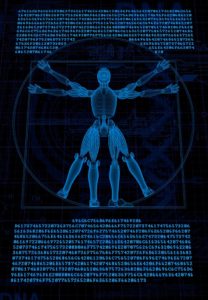
Machine learning presents exciting opportunities in the advancement of healthcare.
Today, we will explore another tool gaining traction in the healthcare industry: machine learning. Often associated with big data, machine learning technology can utilize its capabilities to make advancements in medicine. Humans alone cannot make sense of the massive amounts of health data available to us today. Artificial intelligence can streamline several of the processes in delivering treatment to patients and managing the health of the public. Before we examine some real-world examples of machine learning in healthcare, let’s go over what is machine learning.
What is Machine Learning?
Machine learning is an application of artificial intelligence. As its name suggests, the program uses algorithms to process multiple data sets in order to “learn” information from its experience. Taking what it has learned, the program can make its own adjustments to interpret data without being explicitly programmed to do so. Like it does in big data, the technology observes and analyzes data for patterns and trends. It can use its ever-adapting knowledge to make predictions about the data.
Real-World Examples
Machine learning can be used in medical imaging diagnosis. Google has used the computer-based reasoning tool to develop algorithms to identify tumors on mammograms. The implication that this technology can process image datasets means it can be trained to detect abnormalities in the scans. The inconsistencies may or may not be malignant, but it certainly helps with directing attention to these areas, increasing overall efficiency and accuracy in making diagnoses.
Because this technology can recognize patterns, this useful feature can be adapted to hospital administrative processes. Maintaining health records is a necessary but costly task — in terms of time, money, and effort. Handwriting recognition, something we can see in today’s smart devices, can help with updating and maintaining the digital records. Accessing the most recent and complete patient information can be critical to delivering the best care. Even improving healthcare-related auxiliary processes make providing patient care more effective.
The predictive capabilities can assist with clinical trials and research. By accessing its repository of health data, machine learning technology can identify the best candidates for clinical trials so researchers can work from a diverse pool of information. This alone can cut down on the time and money needed to conduct a clinical research study, and produce accurate findings more quickly.
Humans Do What Machines Can’t
Healthcare practitioners should not worry about machine learning and artificial intelligence making their jobs obsolete. This technology is a tool to assist medical professionals. Ultimately, an unparalleled element of healthcare is the human touch and interactions. Like other technological advancements, the capabilities serve to improve care and treatment, but cannot replace other critical aspects like compassionate care or ethics in medicine.
Healthcare IT Services and Solutions from Audley Consulting Group
The experts at Audley Consulting Group dedicate their passion and work to providing exceptional healthcare-centered IT services to our clients. Our consultants uncover your business needs to tailor an effective information technology solution that is unique to your situation. We proudly serve public and private sector clients in the Washington DC, Maryland, Virginia areas, and beyond. Audley Consulting group has delivered value-added IT services to businesses and government agencies. We can show how our healthcare IT services can benefit you too. To get started, call us at 301-770-6464, or visit our website. Follow us on Facebook, Twitter, and LinkedIn.